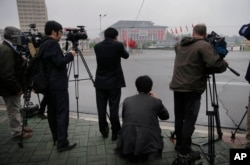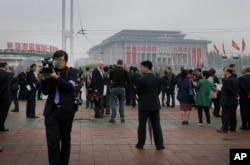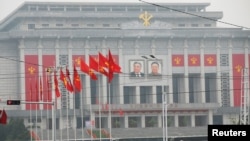After inviting hundreds of international journalists to cover its first ruling party congress in 36 years, North Korea barred the media from entering the actual event.
The Workers' Party Congress is the biggest political convention held in North Korea in generations and is expected to bolster young leader Kim Jong Un’s power and formalize his "Byongjin" policy to push simultaneously for economic development and nuclear capability.
The last party congress was held in 1980, before Kim Jong Un was born, and was staged to legitimize his father Kim Jong Il as the heir apparent to the North's founding ruler Kim Il Sung, the grandfather of the current leader.
Kim was expected to address the opening session of the party congress that is supposed to last for four days, but that part of the event was closed to the media and not broadcast on state-run television.
Broadcasting live nearby
The Washington Post Tokyo bureau chief Anna Fifield was actually able to broadcast live over the internet outside the April 25 House of Culture where the event is taking place, but was not allowed inside.
The Washington Post reporter used the Periscope mobile phone app to send live video, showing groups of reporters and their North Korean government appointed escorts waiting across the street from the event.
Periscope viewers sent in questions asking her how she was able to access the internet in a country that supposedly strictly limits access to information from the outside world.
Fifield explained she was able to set up a VPN - virtual private network - that bypassed the restrictions on her North Korean mobile phone service.
The international media were later sent back to the press center in their hotel and allowed to watch live coverage of the congress over closed circuit TV.
International media
North Korea invited about 100 foreign journalists to cover the congress, although their movements have been closely managed and much of the country and its people remain off-limits to outsiders.
VOA, which broadcasts news into North Korea over medium and short wave radio frequency transmissions, was not invited to join in the international coverage of the event.
Leading up to the congress the invited journalists were taken on carefully controlled tours of schools and farms to showcase a content and prosperous society.
Hunger still an issue
Poverty and malnutrition in the North, however, are still believed to be widespread, even though agriculture reforms and the emergence of some private markets have reportedly improved conditions for many.
The U.N. Food and Agriculture Organization (FAO) said in a February report that the North Korean people are suffering a significant food shortage.
Reuters correspondent James Pearson, who covers North Korea, noted that conditions in the capital seem to be improving. He said there are “more taxis and private cars on the streets, more goods in shops, and more buildings under construction that attest to growing prosperity and consumption among Pyongyang residents.”
Press restrictions
BBC’s Seoul Correspondent Steve Evans said relations between the journalists and their government handlers have been at times tense and they were often restricted as to what they could see and who they could talk to.
Human rights activist Phil Robertson with Human Rights Watch also criticized the orchestrated political spectacle in Pyongyang for not addressing the widespread and systematic atrocities in the country, documented by the United Nations, that include a network of political prisons, murder, enslavement, torture and rape.
“Kim Jong Un talks a lot about improving the lives of North Koreans, but we’ll only know if he’s serious, if he takes action to end human rights abuses,” he said.
There is also speculation that North Korea is preparing another nuclear test to coincide with the congress in defiance of the tough new international sanctions imposed on Pyongyang after its last nuclear test in January.
Since Kim took power after the death of his father in December 2011, North Korea has carried out two nuclear tests and two space rocket launches that were widely seen as disguised ballistic missile tests.










